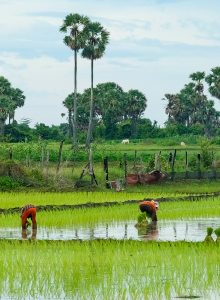For various reasons, family histories are uncommon in Cambodia. Many of the few records that did exist were destroyed during the Khmer Rouge period (1975 to 1979). With up to one-third of the adult population killed during the purges, the population is young and the remainder of the older generation’s stories are being rapidly lost. Many of Cambodia’s younger generation hardly know their families’ backgrounds.
Formally launched in January 2016, The Cambodia Oral History Project seeks to capture these stories by engaging local youth in the process. Youth and young adults in Cambodia interview family members to learn about their lives and stories. The project represents a broad partnership between Brigham Young University (faculty, staff, and students) and family history specialists, with the cooperation of local Cambodian leaders of The Church of Jesus Christ of Latter-day Saints.
Project Aims
• Capture the fading stories of the “lost generation” of Cambodia.
• Connect the youth with parents and grandparents; provide printed and audio versions of histories to participant families.
• Create a repository of oral histories that would enrich Cambodian culture.
• Develop writing, research, and foreign language skills for BYU student participants and for local Cambodian youth.
• Provide opportunities for scholarly work on local histories, area studies, and narratological aspects of family histories.
Approach
Two types of collection:
1. Professional, in-depth video recorded interviews.
2. Video/Audio interviews conducted by Cambodian youth in their home provinces, and photos of family members.
The former is led by experienced interviewers from Cambodia and/or the US (BYU) and carried out at church buildings where possible. The latter is done by teams of youth and young adults and led by peer leaders, who receive training in techniques and protocols by BYU faculty specialists. These teams are organized by province (with a focus on holiday periods when participants are normally together with extended family).
Population
Parents, grandparents, aunts, uncles, others. Target age group: 50 +

